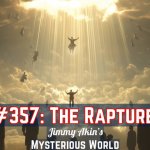
 Jimmy Akin's Mysterious World
Jimmy Akin's Mysterious World The Rapture (Millennium, Tribulation, Premillennial, Pretribulation, Posttribulation, End of Days)
6 snips
Mar 28, 2025 Delve into the captivating concept of the Rapture and its controversial interpretations among Christians. Explore historical fears surrounding biblical prophecies and how societal concerns of the 1970s shaped beliefs. Discover the evolution of the pre-tribulational rapture and its influence on evangelical thought. From comedic and serious cultural depictions to theological debates, this discussion navigates the intricacies of end-times beliefs, offering nuanced perspectives from scripture that challenge assumptions about timing and significance.
Chapters
Books
Transcript
Episode notes
1 2 3 4 5 6 7 8 9 10 11
Intro
00:00 • 4min
Exploring Rapture Interpretations
04:05 • 11min
Misconceptions of Crises: A Historical Overview
14:56 • 10min
Understanding Biblical Prophecy and the Concept of the Rapture
24:29 • 4min
Cultural Interpretations of the Rapture
28:45 • 7min
The Rise of Pre-Tribulational Rapture
35:29 • 8min
Binding the Evil: Revelations and Interpretations
43:03 • 9min
Exploring the Rapture: Interpretations and Debates
51:45 • 23min
The Rapture Debate: Examining Biblical Foundations
01:14:38 • 22min
Resurrection and the Second Coming
01:36:25 • 20min
Exploring the Rapture: Tribulation and Biblical Perspectives
01:56:47 • 6min










 Many Christians believe in the Rapture, a mysterious event in which all sincere believers will suddenly vanish. Jimmy Akin and Dom Bettinelli examine the concept of the Rapture, why it is controversial, and what the Bible has to say about it.
Many Christians believe in the Rapture, a mysterious event in which all sincere believers will suddenly vanish. Jimmy Akin and Dom Bettinelli examine the concept of the Rapture, why it is controversial, and what the Bible has to say about it.